Learning vocabulary related to daily routines is crucial for anyone studying Chinese. The words and phrases in this article will help you describe your day-to-day activities, improve your overall language skills, and allow for more natural conversations with native speakers.
Morning Routine
1. Waking Up
- 起床 (qǐ chuáng) - to get up
- 闹钟 (nào zhōng) - alarm clock
- 伸懒腰 (shēn lǎn yāo) - to stretch
- 赖床 (lài chuáng) - to stay in bed
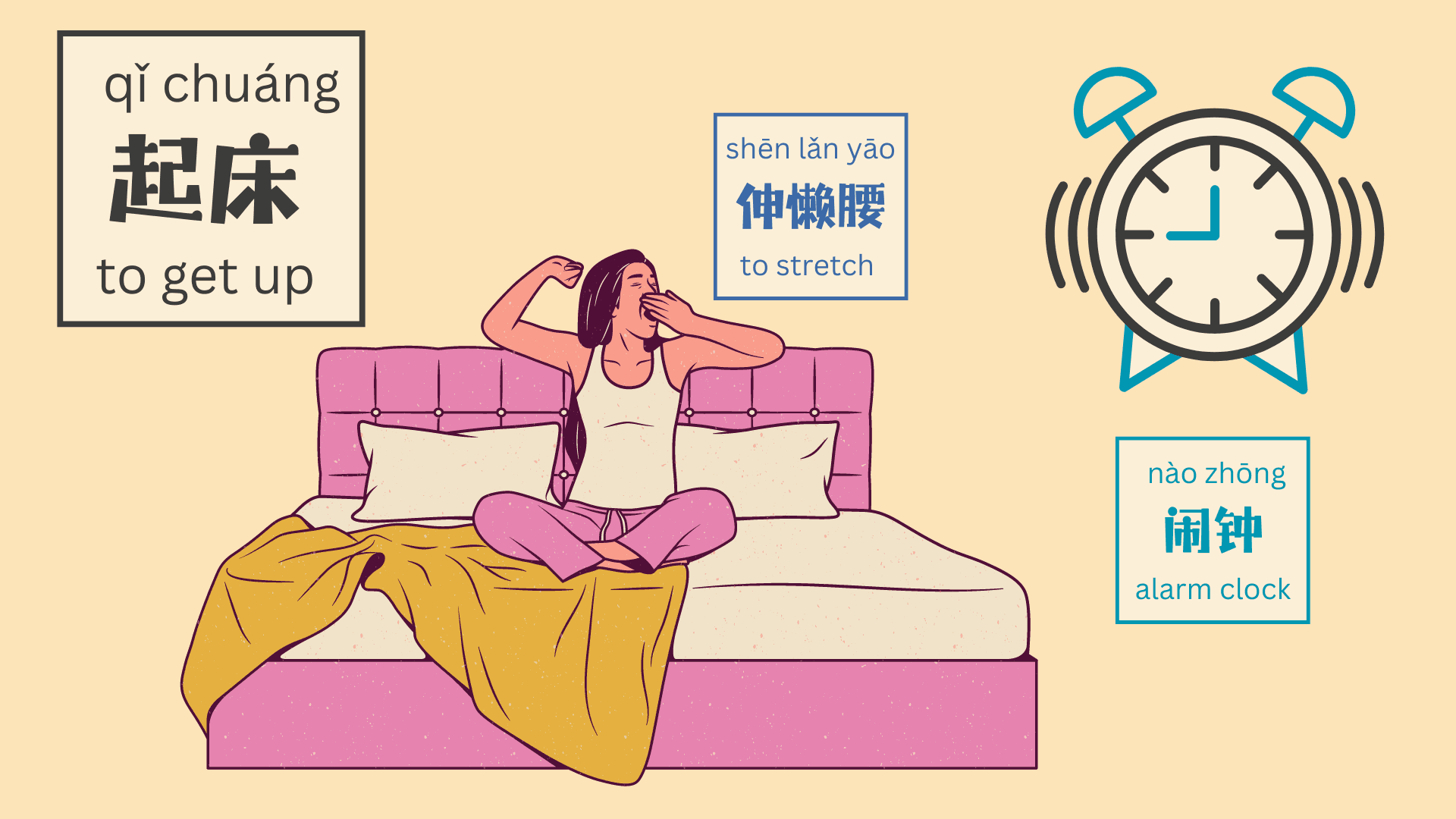
Examples:
- 我每天早上七点起床。
I get up at 7 o'clock every morning.
- 周末我喜欢赖床。
I like to stay in bed on weekends.
2. Morning Hygiene
- 刷牙 (shuā yá) - to brush teeth
- 洗脸 (xǐ liǎn) - to wash face
- 梳头 (shū tóu) - to comb hair
- 剃须 (tì xū) - to shave
- 化妆 (huà zhuāng) - to put on makeup
- 洗澡 (xǐ zǎo) - to take a shower
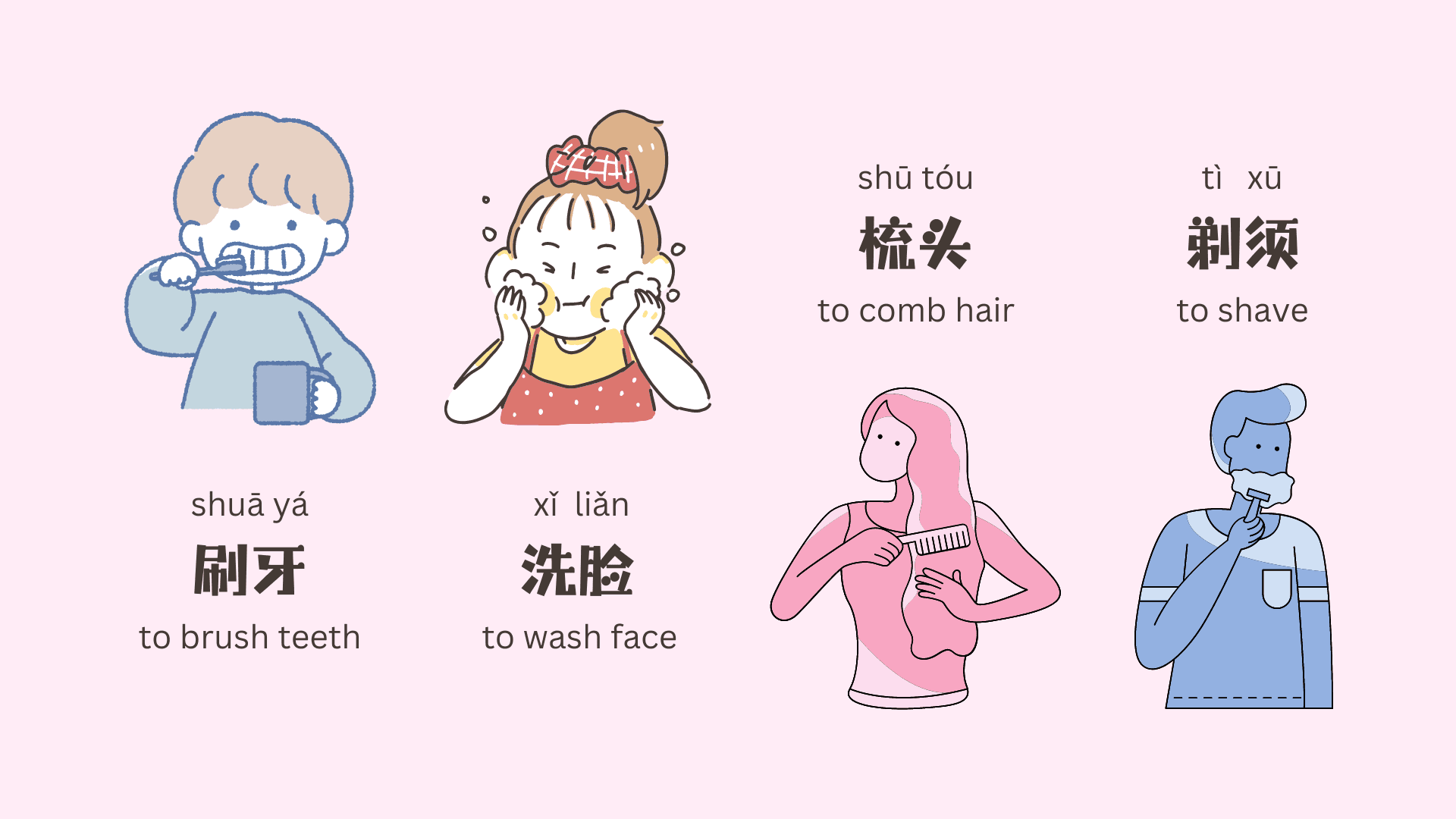
Examples:
- 我每天早上都刷牙和洗脸。
I brush my teeth and wash my face every morning.
- 她总是花很长时间化妆。
She always spends a long time putting on makeup.
- 我通常晚上洗澡,但有时早上也洗。
I usually take a shower in the evening, but sometimes I shower in the morning too.
3. Breakfast
- 早餐 (zǎo cān) - breakfast
- 喝咖啡 (hē kā fēi) - to drink coffee
- 吃面包 (chī miàn bāo) - to eat bread
- 煮鸡蛋 (zhǔ jī dàn) - to boil eggs
- 喝豆浆 (hē dòu jiāng) - to drink soy milk
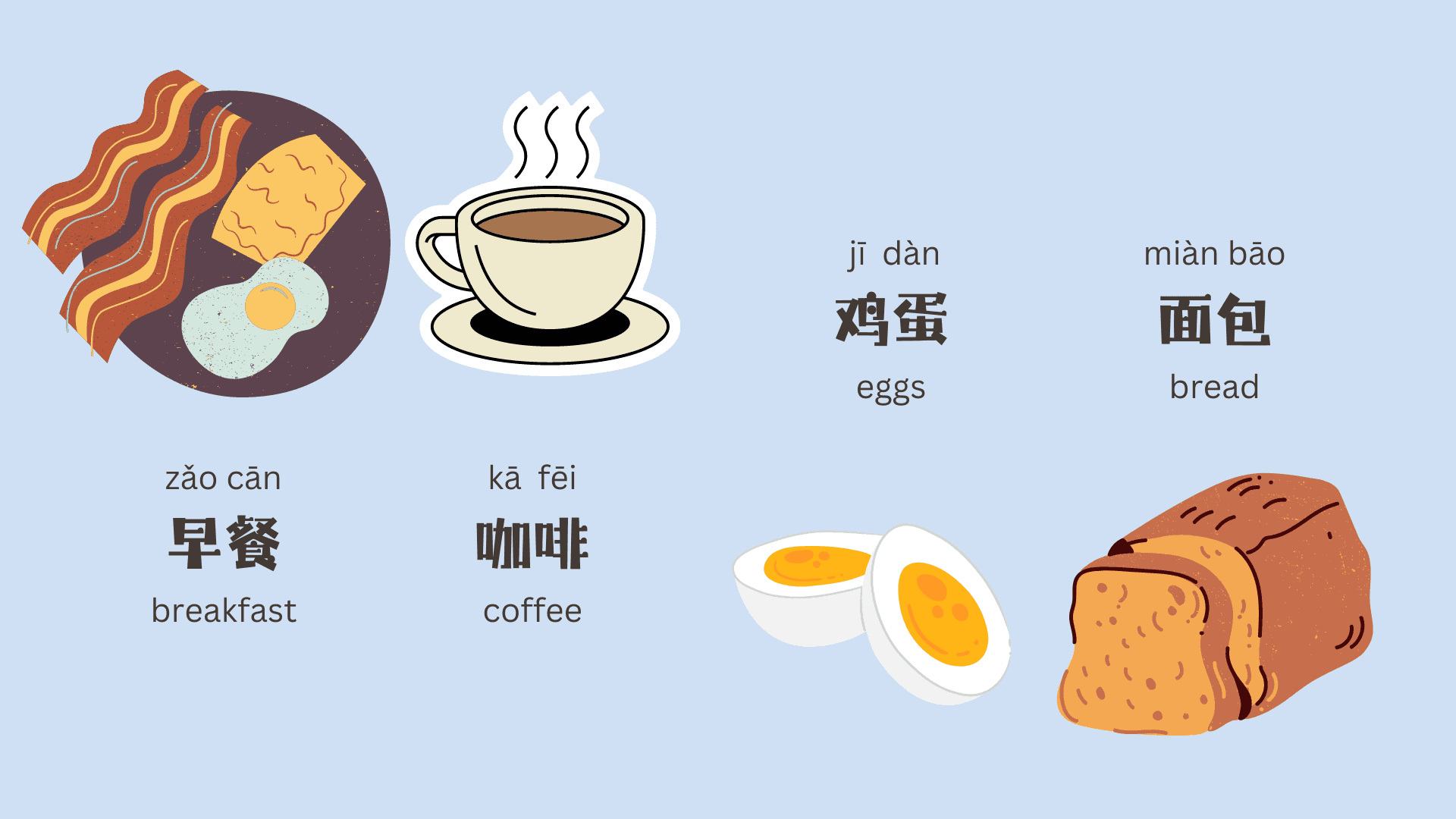
Examples:
- 我的早餐通常是一杯咖啡和一个鸡蛋。
My breakfast is usually a cup of coffee and an egg.
- 中国人早餐常喝豆浆。
Chinese people often drink soy milk for breakfast.
4. Getting Dressed
- 穿衣服 (chuān yī fu) - to put on clothes
- 系鞋带 (jì xié dài) - to tie shoelaces
Examples:
- 我穿好衣服后就出门了。
I left the house after getting dressed.
- 小朋友正在学习系鞋带。
The child is learning how to tie shoelaces.
Work or School
1. Commuting
- 坐公交车 (zuò gōng jiāo chē) - to take the bus
- 开车 (kāi chē) - to drive a car
- 坐地铁 (zuò dì tiě) - to take the subway
- 骑自行车 (qí zì xíng chē) - to ride a bicycle
- 走路 (zǒu lù) / 步行 (bù xíng) - to walk
- 打车 (dǎ chē) - to take a taxi
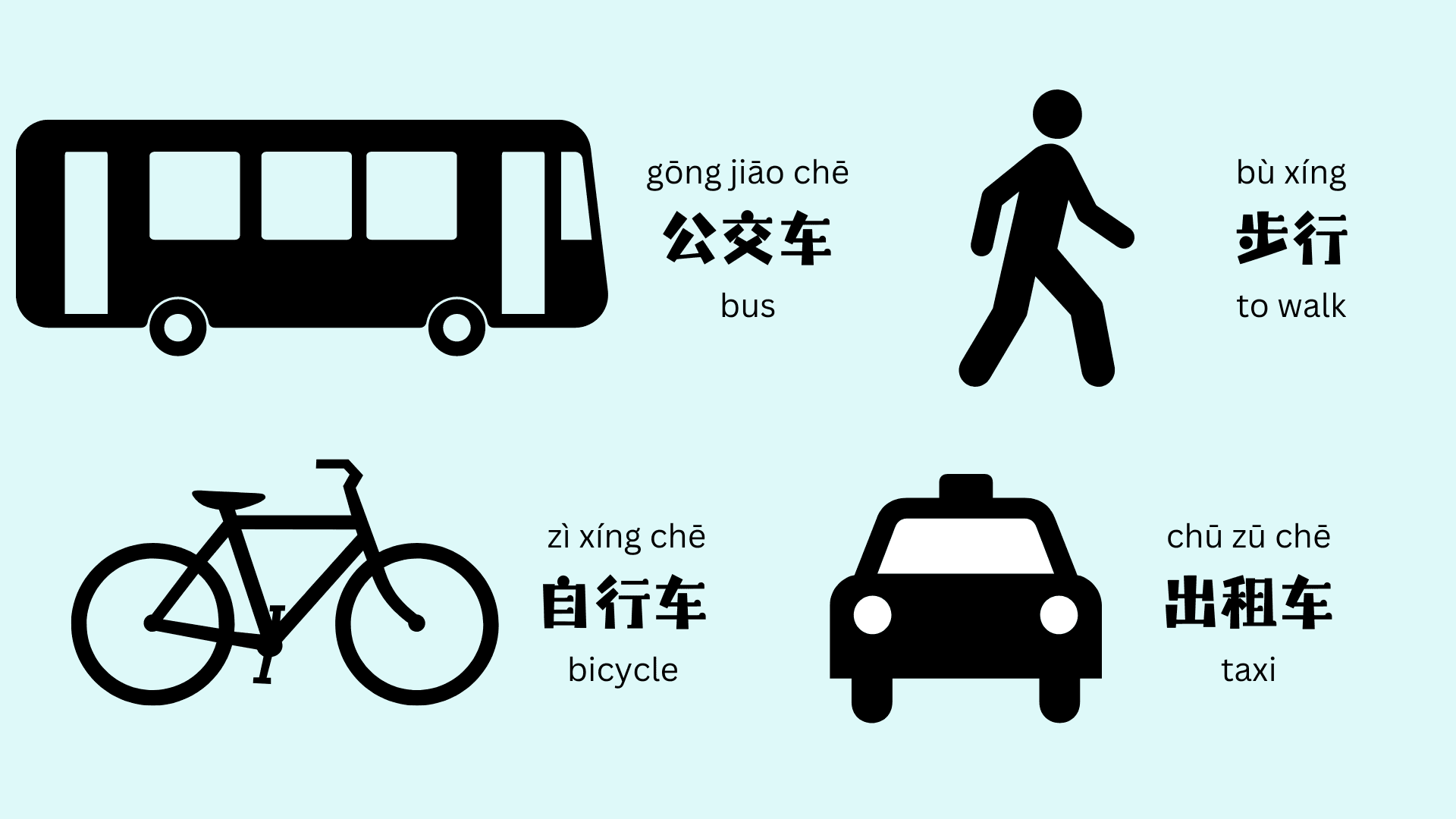
Examples:
- 我每天坐地铁去上班。
I take the subway to work every day.
- 他喜欢骑自行车去学校。
He likes to ride a bicycle to school.
- 如果下雨,我就打车去办公室。
If it rains, I take a taxi to the office.
2. At Work/School
- 上班 (shàng bān) - to go to work
- 上课 (shàng kè) - to attend class
- 开会 (kāi huì) - to have a meeting
- 做报告 (zuò bào gào) - to give a presentation
- 写报告 (xiě bào gào) - to write a report
- 回复邮件 (huí fù yóu jiàn) - to reply to emails
- 做实验 (zuò shí yàn) - to do an experiment
- 考试 (kǎo shì) - to take an exam
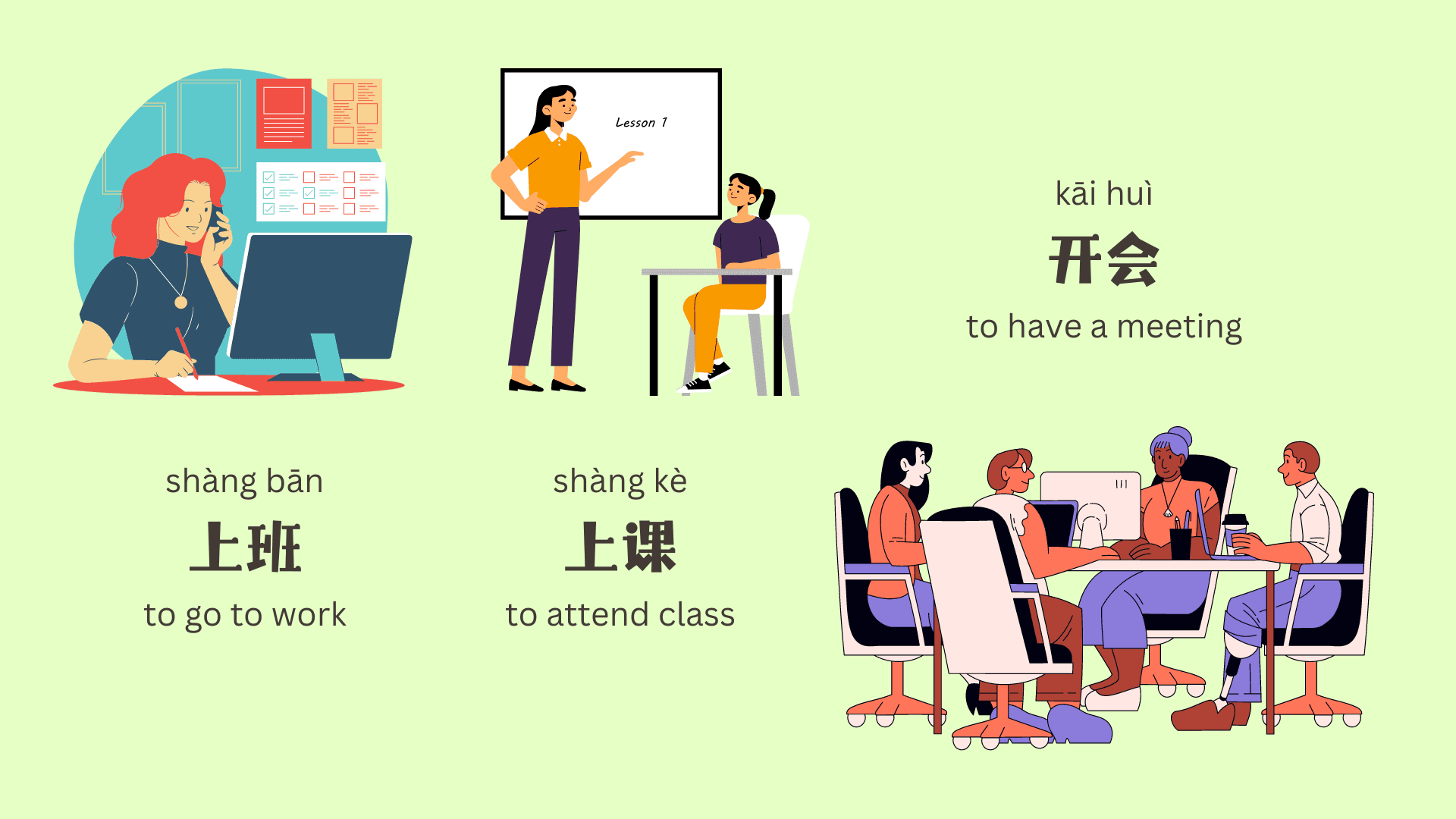
Examples:
- 今天下午我要开会和做报告。
This afternoon, I have a meeting and need to give a presentation.
- 学生们正在做实验和写报告。
The students are doing experiments and writing reports.
- 我每天早上先回复邮件,然后开始其他工作。
Every morning, I reply to emails first, then start other work.
Afternoon Activities
1. Lunch
- 吃午饭 (chī wǔ fàn) - to eat lunch
- 点菜 (diǎn cài) - to order food
- 打包 (dǎ bāo) - to get takeout
Examples:
- 我们一起去餐厅吃午饭吧。
Let's go to the restaurant together for lunch.
- 他正在点菜,想吃些中国菜。
He's ordering food and wants to eat some Chinese dishes.
- 我没时间在餐厅吃饭,所以打包带回办公室。
I don't have time to eat at the restaurant, so I'm getting takeout to bring back to the office.
2. Break Time
- 小憩 (xiǎo qì) - to take a nap
- 喝下午茶 (hē xià wǔ chá) - to have afternoon tea
- 聊天 (liáo tiān) - to chat
Examples:
- 午饭后我喜欢小憩一会儿。
I like to take a short nap after lunch.
- 很多人喜欢下午三点左右喝下午茶。
Many people like to have afternoon tea around 3 p.m.
- 同事们经常在茶水间聊天。
Colleagues often chat in the pantry.
Evening Routine
1. Dinner
- 做饭 (zuò fàn) - to cook
- 吃晚饭 (chī wǎn fàn) - to eat dinner
- 洗碗 (xǐ wǎn) - to wash dishes
- 点外卖 (diǎn wài mài) - to order takeout
- 去餐厅 (qù cān tīng) - to go to a restaurant
Examples:
- 今晚我想点外卖,不想做饭。
Tonight, I want to order takeout; I don't feel like cooking.
- 我们全家人一起吃晚饭。
Our whole family eats dinner together.
- 周末我们常去餐厅吃饭,这样就不用洗碗了。
We often go to restaurants on weekends, so we don't have to wash dishes.
2. Relaxation
- 看电视 (kàn diàn shì) - to watch TV
- 读书 (dú shū) - to read a book
- 上网 (shàng wǎng) - to surf the internet
- 听音乐 (tīng yīn yuè) - to listen to music
- 打游戏 (dǎ yóu xì) - to play video games
- 跑步 (pǎo bù) - to go for a run
- 散步 (sàn bù) - to take a walk
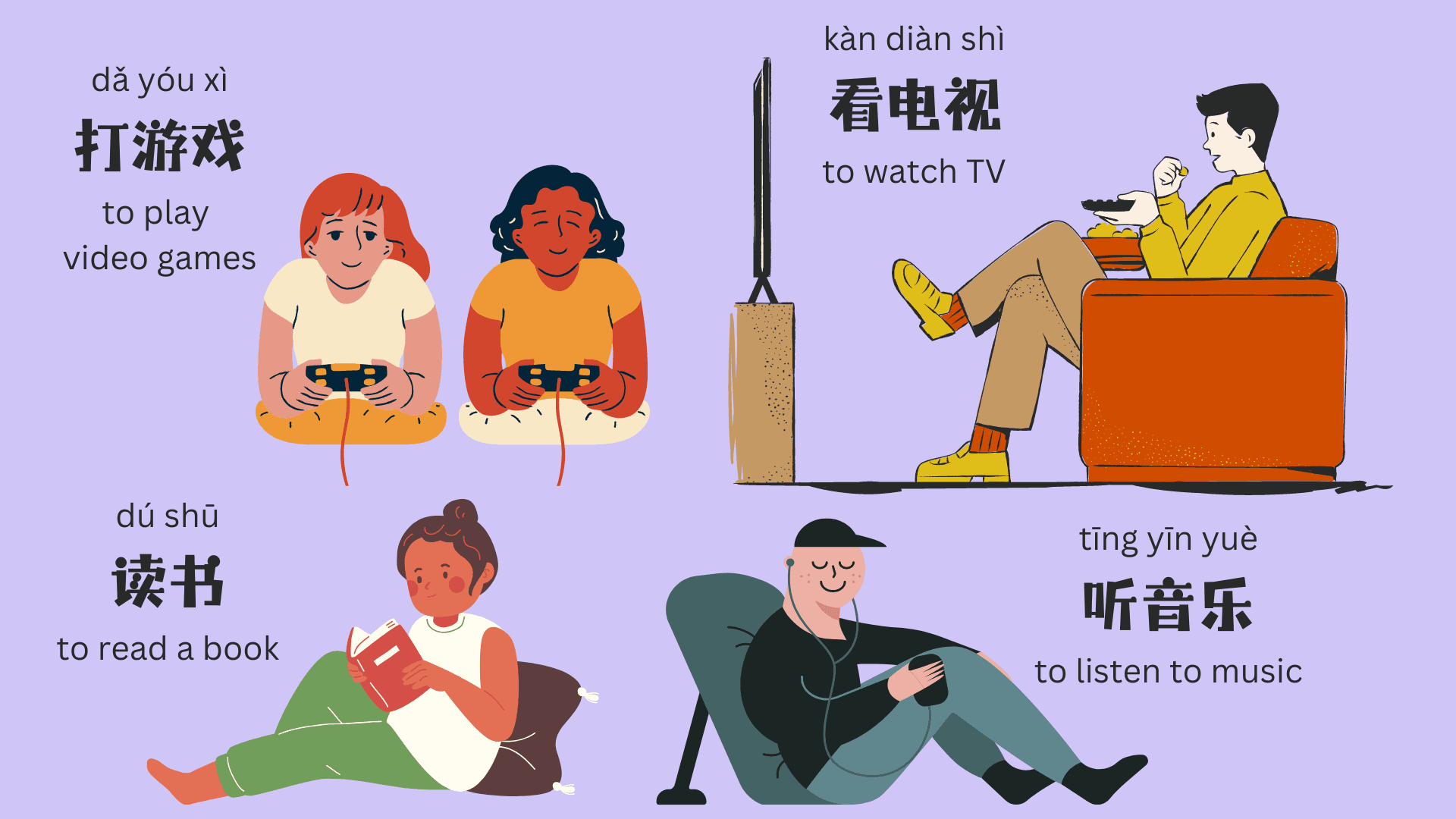
Examples:
- 晚饭后我喜欢散步或者看电视。
After dinner, I like to take a walk or watch TV.
- 他每天晚上都要读书一个小时。
He reads books for an hour every night.
- 周末我常常和朋友一起打游戏或者听音乐。
I often play video games or listen to music with friends on weekends.
3. Bedtime
- 洗澡 (xǐ zǎo) - to take a shower
- 刷牙 (shuā yá) - to brush teeth
- 睡觉 (shuì jiào) - to sleep
Examples:
- 我通常晚上十一点睡觉。
I usually go to sleep at 11 p.m.
- 睡觉前,我总是先洗澡再刷牙。
Before bed, I always take a shower first and then brush my teeth.
- 他有在睡觉前读书的习惯。
He has a habit of reading books before going to sleep.
Your Chinese Routine Starts Now
Learning these common Chinese words and phrases for daily routines will greatly enhance your ability to communicate about everyday life. Practice using these words and phrases in context, and you'll find yourself more comfortable in conversations about daily activities.
Practice Exercise
Now that we've covered vocabulary for an entire day in Chinese, let's put your new knowledge to the test. Try filling in the blanks with the appropriate Chinese words or phrases. Don't worry if you get stuck - the answers are provided at the bottom but challenge yourself to complete the exercise without peeking!
- 早上我 ______ (get up) 后立即 ______ (brush teeth)。
- 我每天 ______ (take the subway) 去上班。
- 午饭后,我喜欢 ______ (take a short nap)。
- 晚上我常常 ______ (read a book) 或 ______ (watch TV)。
- 睡觉前,我总是 ______ (take a shower) 和 ______ (brush teeth)。
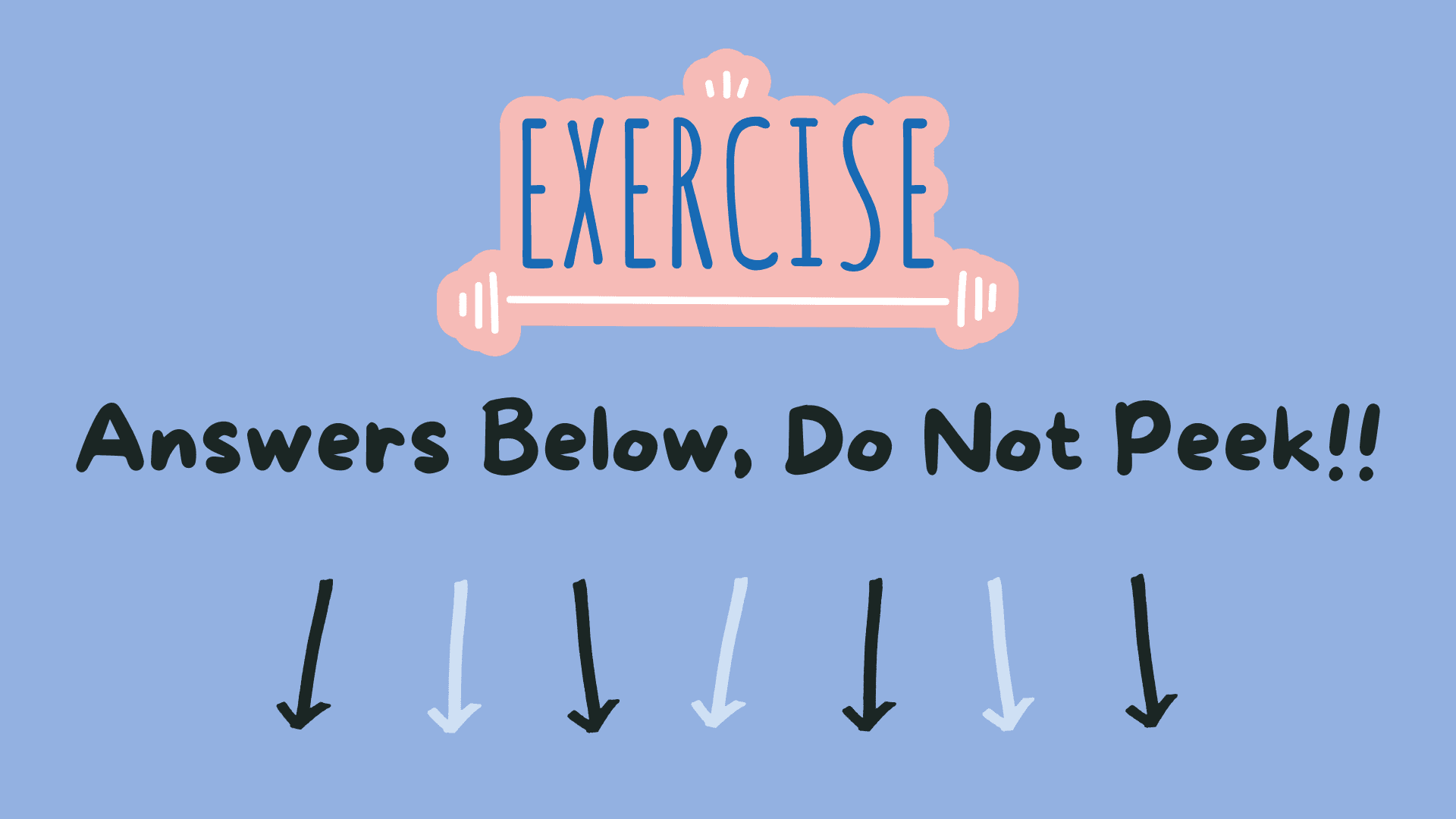
(Answers: 1. 起床, 刷牙 2. 坐地铁 3. 小憩 4. 读书, 看电视 5. 洗澡, 刷牙)